A&S Geography Faculty Member Recognized for Teaching Excellence at SEDAAG
By Ellie Wnek
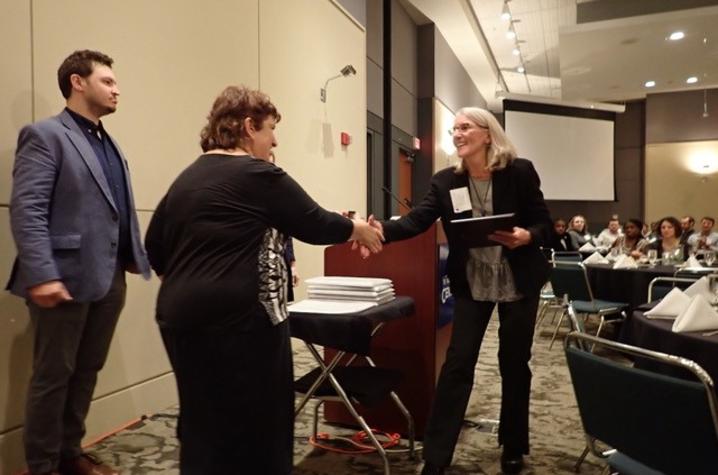
UK faculty member Lynn Phillips received the 2018 South Eastern Division of the American Association of Geographers (SEDAAG) Excellence in Teaching Award.
The University of Kentucky Department of Physics and Astronomy and the MacAdam Student Observatory presents Kentucky SkyTalks as part of an ongoing outreach series. Each SkyTalk starts with a 40-minute presentation about astronomy followed by an opportunity to visit the observatory across the street. These presentations are free and open to the public. Visits to the observatory are weather dependent.
By Ellie Wnek

UK faculty member Lynn Phillips received the 2018 South Eastern Division of the American Association of Geographers (SEDAAG) Excellence in Teaching Award.
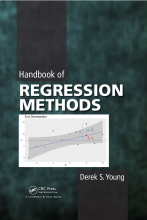
Handbook of Regression Methods concisely covers numerous traditional, contemporary, and nonstandard regression methods. The handbook provides a broad overview of regression models, diagnostic procedures, and inference procedures, with emphasis on how these methods are applied. The organization of the handbook benefits both practitioners and researchers, who seek either to obtain a quick understanding of regression methods for specialized problems or to expand their own breadth of knowledge of regression topics.
This handbook covers classic material about simple linear regression and multiple linear regression, including assumptions, effective visualizations, and inference procedures. It presents an overview of advanced diagnostic tests, remedial strategies, and model selection procedures. Finally, many chapters are devoted to a diverse range of topics, including censored regression, nonlinear regression, generalized linear models, and semiparametric regression.
Features

Pollyannas take heart, pessimists take note: Recent studies on achievement and well-being show that optimistic behavior contributes to better physical health, greater resilience in the face of life’s twists and turns, and more satisfying relationships. As psychologist Suzanne Segerstrom reveals, optimists lay groundwork for the success they envision. While the rest of us worry whether our goals are attainable, those who practice optimism try to achieve theirs. Breaking Murphy’s Law shows you simple ways to develop the skills that natural-born optimists use to get what they want from life. Dr. Segerstrom helps you break free from the inertia of cynicism and self-doubt and encourages you to engage the world around you. “Doing optimism”--by getting involved, working hard, and enjoying your achievements--establishes a positive feedback loop that’s both personally transformative and self-perpetuating. This practical book imparts the lesson with a mix of humor and intelligence that will convince even the most hardened cynics that Murphy got it wrong.
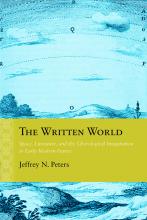
In The Written World: Space, Literature, and the Chorological Imagination in Early Modern France, Jeffrey N. Peters argues that geographic space may be understood as a foundational, originating principle of literary creation. By way of an innovative reading of chora, a concept developed by Plato in the Timaeus and often construed by philosophical tradition as “space,” Peters shows that canonical literary works of the French seventeenth century are guided by what he calls a “chorological” approach to artistic invention. The chorological imagination describes the poetic as a cosmological event that gives location to—or, more accurately, in Plato’s terms, receives—the world as an object of thought.
In analyses of well-known authors such as Corneille, Molière, Racine, and Madame de Lafayette, Peters demonstrates that the apparent absence of physical space in seventeenth-century literary depiction indicates a subtle engagement with, rather than a rejection of, evolving principles of cosmological understanding. Space is not absent in these works so much as transformed in keeping with contemporaneous developments in early modern natural philosophy. The Written World will appeal to philosophers of literature and literary theorists as well as scholars of early modern Europe and historians of science and geography
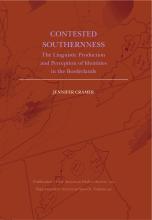
Contested Southernness deals with the interaction between language, identity, and borders, using Louisville, Kentucky, located at the northern border of the Southern dialect region, as a case in point these interactions that appear to be neither simple nor straightforward. Through an examination of a variety of production and perception data, Louisvillians are shown to vary in their attitudes toward and production and perception of certain linguistic features in a way that indicates that they experience the border as the coming together of at least two distinct regions, one Southern and one non-Southern, seemingly choosing to align or disalign with different ones randomly. Non-Louisvillians, on the other hand, view the urban center as the other in the largely rural state. Using the example of Louisville, identities at the border are shown to be fluid, complex, and dynamic, where speakers constantly negotiate, contest, and shift between identities, in the active and agentive expression of their amplified awareness of belonging brought about by their position on the border.
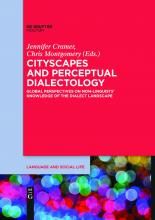
This edited collection presents papers relating to the state of the art in Perceptual Dialectology research. The authors take an international view of the field of Perceptual Dialectology, broadly defined, to assess the similarities and contrasts in non-linguists’ perceptions of the dialect landscape. The volume is global in focus, and chapters discuss data gathered in the United States, the United Kingdom, the Republic of Ireland, France, Germany, Austria, and South Korea. The common methods used by many of the contributors means that readers will be able to draw comparisons from the breadth of the volume. The primary focus of this volume is geared toward an examination of dialect perceptions in and of cities, with an additional goal of presenting empirical, theoretical, and methodological advancements in Perceptual Dialectology. Authors’ contributions to the collection examine how the urban setting influences perceptions of linguistic variation and, in the course of examining the connections between place and perceptions, explore several interrelated themes of linguistic variation, including the differences in the perception of rural and urban areas, processes of perception and language change, and the relationship between perception and ‘reality’.